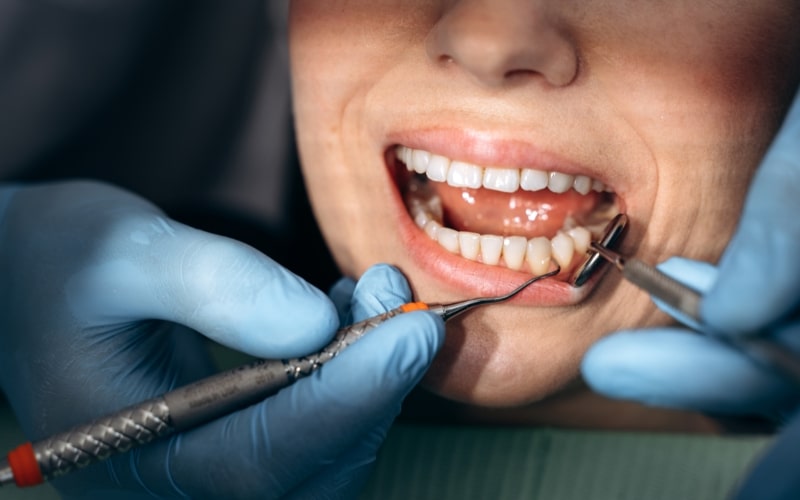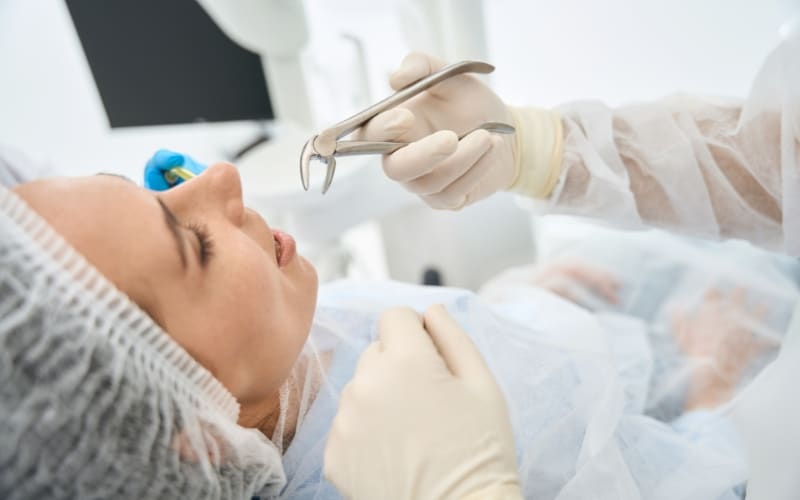New Patients Welcome!

Periodontal disease, or gum disease and periodontitis, is a chronic disease. If left unaddressed, it can lead to tooth loss. The inflammation and irritation of the gingival tissues that encircle and support the teeth mark the onset of gum disease. Plaque’s toxic chemicals cause this inflammation. The toxins result in a chronic bacterial infection.
GUM DISEASE: WHAT CAUSES IT?
Gum disease can be hereditary and environmentally influenced. Gum disease occurs in many cases as a result of a combination of genetic and environmental factors. Taking preventative measures to decrease your risk of developing periodontitis might help you live a more comfortable life.
Gum disease can occur as a result of any number of factors, some of which are more serious than others. Here are some of the most prevalent causes:
DENTAL HYGIENE ISSUES
Home prevention of dental disease is possible by maintaining excellent oral hygiene and consuming a well-balanced diet. Preventive dental care, encompassing exams, cleanings, and X-rays, is a regular dental examination. Intensive and professional home care maintains the natural dentition and the supporting bones. Unremoved calculus (tartar) and bacteria lead to gingivitis or periodontitis, which both lead to tooth loss.
EXCESS USE OF TOBACCO
Gum disease is linked to smoking and other habits. According to research, smoking and other forms of tobacco use are among the most important causes of gum disease development and progression. Smokers are also far more likely to have calculus (tartar) build-up on their teeth, deep pockets in the gingival tissue, and significant bone loss than non-smokers.
PREDISPOSITION DUE TO GENETICS
Gum disease may run in families, affecting 30% of the population. Gum disease is more common among individuals with a strong hereditary inclination. Periodontal disease is six times more likely to develop in those who have a genetic predisposition. Genetic tests can reveal susceptibility, and early treatment can prevent the oral cavity from becoming diseased.
MENOPAUSE AND PREGNANCY
Brushing and flossing should be done on a daily basis throughout pregnancy. Gum tissue becomes more sensitive during pregnancy as a result of hormonal changes in the body, making it more prone to gum disease.
CHRONIC STRESS AND AN UNHEALTHY DIET
Stress impairs the body’s immune system, making it more difficult for it to fight infection. Bacterial infection can overcome the body’s defense mechanisms when stress is high. Poor nutrition or malnutrition can also reduce a person’s defenses against periodontal disease and gingivitis, as well as the health of his or her teeth.
RELATED MEDICAL PROBLEMS
Respiratory illness, heart disease, rheumatoid arthritis, and osteoporosis are all examples of medical problems that can exacerbate or accelerate the development and progression of gum disease. Diabetes impairs the body’s ability to use insulin, making bacterial gum infection more difficult to manage and cure.
TEETH GRINDING
The supporting tissue surrounding the teeth may be severely damaged when teeth are clamped or ground. Grinding one’s teeth is often connected to a “poor bite” or tooth alignment problems. Gum disease can speed up the progression of the illness if the gingival tissue is destroyed due to grinding as a result of gum disease.
MEDICATION
Gum disease is more common in people who use corticosteroid drugs. Oral contraceptives, heart medicines, antidepressants, and steroids all have an impact on the overall health of teeth and gums, making them more vulnerable to gum disease. Steroid use promotes gingival overgrowth, which causes more frequent swelling and allows germs to proliferate faster in the gum tissue.
GUM DISEASE TREATMENT
A periodontist specializes in treating gum disease and performing procedures like implanting dentures. They use techniques such as scaling and root planing for deep pocket cleaning. Additionally, they may prescribe antibiotics and antifungals to treat infections and prevent further illness.
In cases of tooth damage, the dentist can employ various treatment methods. For instance, a periodontist may use tissue transplants to stimulate natural tissue regeneration after tooth loss. They can also place dental implants if one or more teeth are missing. Furthermore, the periodontist can reshape gingival tissue to achieve a smooth and aesthetically pleasing appearance, especially in cases of gum recession affecting the smile.
For comprehensive periodontal treatment in Ventura, consult with our professional periodontists at the Smile Shapers Clinic.
PREVENTING PERIODONTAL DISEASE
Gum disease is a serious issue that can cause significant damage. The best way to prevent periodontal disease is by taking proactive steps to address its root causes and discussing them with your dentist.
Regular dental appointments are crucial in preventing gum disease. During these visits, your dentist will clean your teeth thoroughly, removing bacteria and plaque that contribute to gum disease.
In Ventura, CA, your dentist will also examine you for signs of gum disease. Early detection is key to treating gingivitis effectively. The sooner a disease is identified, the better the outcome. If you have any questions or concerns about the causes or treatments for gum disease, don’t hesitate to consult your dentist.





